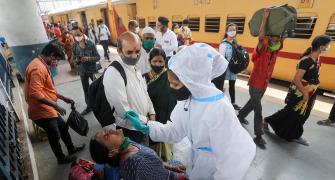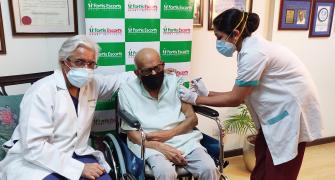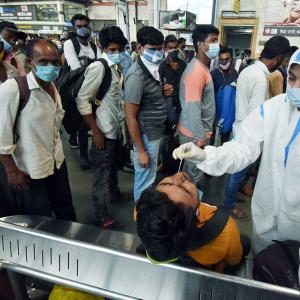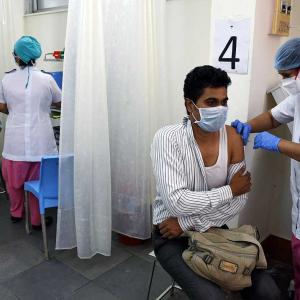'If we wear a mask, social distance and vaccinate as many people, we may come out of this pandemic in 6 months' time.'
'If we decide to be disciplined, we can get out of this pandemic in the next 6 months.'
'If not, it is any body's guess.'

The new entrant after the UK mutant virus, the South African mutant and the Brazil mutant is the Indian 'double mutant' COVID-19 virus.
Is the double mutant more contagious, more fatal?
Will the current vaccines work against this double mutant?
"The virus is not any different from what it was in the beginning. In fact, it appears less harmful now," Dr Rakesh Mishra, Director, Centre for Cellular and Molecular Biology in Hyderabad tells Shobha Warrier/Rediff.com.
How worried should India be about the 'double mutant' variety of covid-19?
We should be worried about the virus in whichever variant form it is. The 'double variant' is the new mutation we have noticed. There is no particular threat from this mutant at this moment.
But we should be worried, for the simple reason that the virus is mutating and some mutations can be dangerous and more troublesome for us. This is the only concern.
Otherwise, from the data that we have right now, it appears the double variant causes no particular concern for us.
How much do we know about this double variant, and how different is it from the other mutants like the UK mutant or the South African variant or the Brazil one?
Each variant is the result of one or multiple mutations that defines the signature of the variant. This one has two mutations that define its signature; the L452R and E484Q. It is quite distinct and has no tangible connect with UK, SA or Brazil variants.
Is it common for two mutations resulting in one variant or is this something unusual?
It is a common thing, and it is not unusual.
In fact, generally all the variants are with multiple mutants. Most variants are often defined by multiple mutations. It is for easier understanding that we say, UK variant or South African variant.
The property of a virus depends on not just one mutation, but multiple ones.
The genome sequence of the virus changes all the time but we ignore those that do not persist in significant proportion in the infected individuals, and give importance only to the ones that are more visible.
This double mutant variant is discussed a lot as it is probably of Indian origin and this combination was not seen anywhere else before. At the moment we cannot say it came from another country.
It is not a matter of great concern as in Maharashtra, about 20 per cent of the cases are because of this double mutant and 80 per cent of the cases have nothing to do with this variant.
It indicates that the recent rise in the number of cases in Maharashtra is not because of this mutant variant.
Since the double mutant is seen as early as December, it is not obvious if it is more infectious.
In other states like Punjab, Kerala, Delhi where cases are rising, we see that less than 2 per cent cases are due to this double mutant variant and therefore of even lesser concern.

Are double mutants more contagious?
No, there is nothing that suggests double mutants are more dangerous than single mutants, or triple mutants are more dangerous than double mutants. It is a matter of chance as mutations are random events.
It looks like the double mutant is not very aggressive as it is not spreading very fast.
Yes, we will know more about this variant in the coming days. At the moment, it doesn't look like this is more contagious.
We also feel it has been there for the last 2-3 months.
For the last 2-3 months?
Yes. We have gone back and looked at the sequence samples and found that this variant has been there from December 2020 onwards.
In November, we did not see any but in December, January and February, we saw many cases.
The question that many people ask is, will the present vaccines work against the double mutant?
It is a genuine concern because of two reasons.
One, it is a new variant.
Two, some independent studies have shown that some immune escape (Immune escape occurs when the immune system of a human being is unable to respond to an infectious agent, or in other words that the host's immune system is no longer able to recognize and eliminate a virus) might have happened when the two mutants L452R and E484Q came together.
In that case, the vaccines might be less effective. But this needs to be validated.
So, we are culturing the virus in the lab and checking whether the serum taken from those vaccinated and also those who have recovered from the infection of the virus, can inhibit the viral growth. This way, we will know whether they are able to neutralise this virus, and whether the vaccine will be protective.
If there was a strong immune escaper, by now we would have seen re-infection associated with this variant which we have not seen so far.
This suggests that vaccines may be effective against this variant as well.
When we do more and more genome sequencing, which we are doing right now, we will know whether there is no immune escaper or whether we have not checked enough.
But the earlier indications show that vaccines should work against this double variant also as we have not seen any re-infections so far.
What study are you doing at CCMB on this double mutant?
We are culturing this variant to test whether it has any peculiar features like avoiding antibody neutralisation which will have implication in assessing vaccine efficacy.
Also, once the culture of this variant is set, we will be in position to assess efficacy of the drug or other interventions if needed.
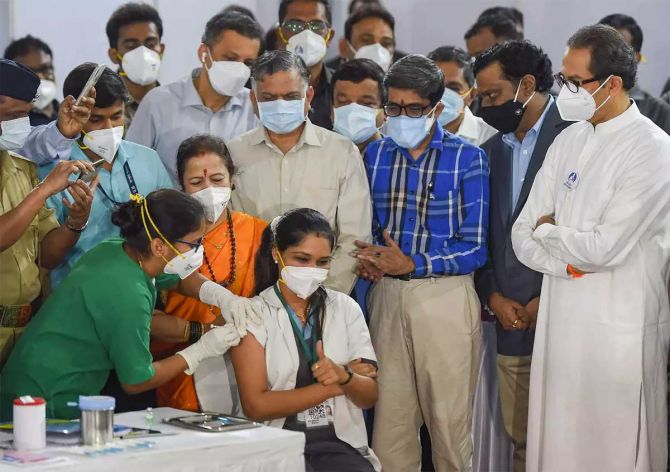
Although so many countries are coming out with vaccines, when the virus is mutating so fast, how will we able to tackle it?
That is why making a vaccine against these kinds of viruses is very challenging. This is also why we need a new vaccine every year against the common cold virus.
We do not know whether we need a new vaccine every year against this virus or not. As time passes, we will know how long these vaccines will protect us.
The most important thing is, we should vaccinate large number of people at a very fast pace.
Before the virus gets a chance to come out with a new avatar, we must cut off its spreading as much as possible.
People should come forward to vaccinate themselves.
If needed, we should get other vaccines from abroad like the RNA vaccines or the Johnson and Johnson vaccine.
In the next 3 months, if we can vaccinate most of our population, it will be great.

It was said that we needed to vaccinate 60 per cent of the population for herd immunity. Do we have to vaccinate 50-60 per cent of the population?
It is difficult to say.
Most people say, 70 per cent or more is required for herd immunity. But in a country like India, it varies from place to place. In some cities, many people already have antibodies.
So, if we can vaccinate 50 per cent of the population considering that there are a lot of people already with antibodies, we will be closer to herd immunity.
Vaccination is a very crucial aspect in fighting the virus. But the most important part is social vaccine.
Many people ask, 'If we have to wear a mask, social distance and wash our hands even after vaccination, why should we vaccinate?' What is your answer to this question?
It is proven that when you get vaccinated, even if you get infected, it will be a very mild infection. So, the intensity of the disease also will be less.
Vaccination also reduces the rate of infection. But it is possible that a vaccinated person may function as a vehicle for transmission of the virus in large population.
Vaccination is like taking extra precaution. Vaccine is an additional tool that has come to check the spread of the virus.
For example, in the UK, it is clearly shown that the rate of infection has come down drastically after they started vaccinating.
If we wear a mask, social distance and vaccinate as many people, we may come out of this pandemic in 6 months' time.
But if we only vaccinate and do not wear masks, it will be a total failure as the virus will stay around us.
Social vaccine is very important in this fight; it is the make or break thing.

Is the exponential spike in covid cases right now on expected lines as people had become complacent and also virus fatigued not just in India but all over the world?
Yes. Covid fatigue leads to not wearing masks and not adhering to social distancing.
Also, in the last few months, we have election activities in many states.
Schools have opened, malls have opened, restaurants have opened. People have started using public transport.
And, in all these places, we see people without masks and without protection.
Even if you are vaccinated, you need to protect yourself.
You know, vaccines have only 80-90 per cent efficacy. When you are in such crowded places, we do not know who that 10 per cent is.
By going to very crowded places without masks, we are only inviting the virus and creating trouble for ourselves.
For some more time, we have to be disciplined. I would go on to say, if you won't wear a mask, you are being uncivil.
It is the responsibility of every citizen to vaccinate and also wear a mask.

In Europe, we see a third wave happening. Generally, how many waves will it take for the virus to slow down?
It depends on how we behave. If everybody wears a mask and vaccination is given to a large number of people, in the next 6 months, we can defeat the virus.
But as you know, people do not follow rules either due to ignorance or due to fatigue or due to carelessness. But masks should be a must for some more months
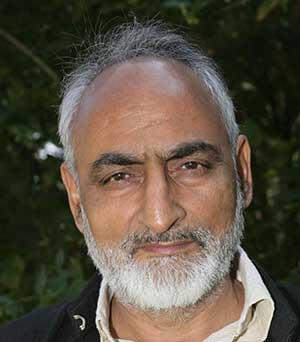 IMAGE: Dr Rakesh Mishra
IMAGE: Dr Rakesh MishraIs the virus having an upper hand over human beings right now?
I will not say that.
If we wear a mask, the virus is helpless. Only when we allow the virus to have an upper hand that it gets the upper hand.
The virus is not any different from what it was in the beginning. In fact, it appears less harmful now.
Maybe because we know how take care of the infected individuals.
Today, recovery is good and mortality rate is also less.
I would say again, if we decide to be disciplined, we can get out of this pandemic in the next 6 months. If not, it is any body's guess.
Feature Presentation: Ashish Narsale/Rediff.com



